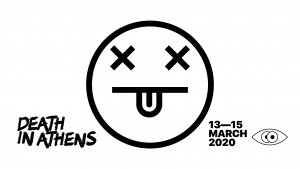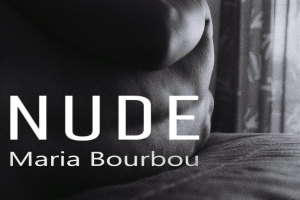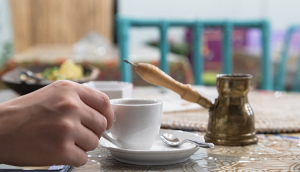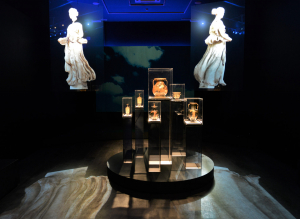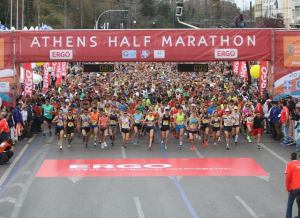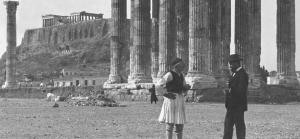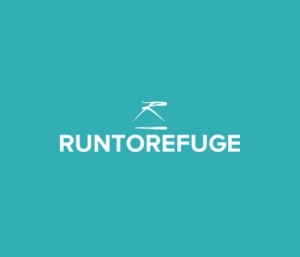ABOUT US
XpatAthens
Athens ArtCore - “Death In Athens”
Friday 13/3 (opening): 18:00-23:00
Saturday 14/3: 14:00-20:00
Sunday 15/3: 14:00-19:00, (closing party): 20:00-24:00
The following initiatives will participate:
- FokiaNou Art Space
- Phoenix Athens
- Domatio
- A-Dash
- APARÄMILLON
- Athens Open Studio
- Backspace
- Come alone
- Communitism
- Institut für Alles Mögliche
- KP Studio
- NOUCMAS
- One Minute Space
- O Meteoritis (Subbotniki)
- Pow Wow
- PS:
- Sektor30
- Snehta
- The Athens Zine Bibliotheque
- EIGHT
- Yellow Brick
- ZOETROPE
Greek Semolina Halva
Serves: 8-10
Difficulty: Intermediate
- 3/4 cups sunflower oil
- 1 cup coarse semolina
- 1 cup fine semolina
- 3 cups granulated brown sugar
- 4 cups water
- Zest of 3 oranges
- 1 teaspoon ground cinnamon
- 1/4 teaspoon ground cloves
- 1 teaspoon vanilla extract
- 150 g almond slivers
2. Toast the almond slivers in a shallow baking pan lined with parchment paper for 5-8 minutes.
3. In a non-stick pot saute the vegetable oil with the fine semolina and coarse semolina, over medium-low heat.
4. Stir the mixture continuously for about 4-5 minutes, until the semolina becomes golden brown. Do not rush this process since semolina burns easily. Sauteeing the semolina gives it a rich and nutty flavor.
5. When ready, add the sugar, water, orange zest, cinnamon, and cloves.
6. Stir for another 10 minutes until the mixture thickens and starts to bubble. You will know it is ready when it starts to pull away from the bottom of the pan.
7. Add the almonds and continue to stir.
8. Transfer the mixture into a 22 cm bundt cake pan, hit the cake pan on a hard surface to make sure the mixture settles and your halva is nice and compact.
9. Turn it over after 5 minutes.
Find this and other great recipes on: akispetretzikis.com
FokiaNou Art Space/ Maria Bourbou: “Nude”
Born in Athens, Maria Bourbou studied Photography at the private photography school «E.M.E.F» of Dimitrios Xliveros in Athens, as well as German Language and Literature at the University of Kiel (Germany). In recent years, Maria Bourbou has been living and working in different countries in Europe. Her work has been exhibited and collected internationally including at the Instituto de Camões in Lisbon, the gallery Teambox, (LX- Factory, Lisbon) and at the Konrad Adenauer Building of the European Parliament in Luxemburg. She recently had a solo show at the Hellenic American Union in Athens, and has participated in many group exhibitions, most recently at the Salon du CAL 2018 in Luxembourg, at “Back to Athens 6” (International Art Festival in Athens), presenting the digital poem «Myopia» . Some of the works in this series were shown in the exhibition “Gender and Other Boundaries” at the Museum of Archeology and Ethnography of Setúbal, Portugal.
FokiaNou Art Space is an artist-run project space in the intimacy of a small apartment in an old building in the center of Athens. The space encourages collaborative creative efforts between Greek and foreign artists, thereby promoting and supporting the local art community. The space hosts exhibitions, workshops and projects under the direction of two artists, Mary Cox and Panagiotis Voulgaris.
Opening: Saturday 7 March 19.00
Duration: 7 – 28 March 2020
Hours: Thursday – Saturday 17.00-20.00
Greek Hospitality Explained
To read this article in full, please visit: Greece-is.com
Tax Returns Platform To Open At The End Of March
To read this article in full, please visit: ekathimerini
Greeks Are the Cleanest People In Europe In Terms Of Hand-Washing
To read this article in full, please visit: Greek City Times
"For These We Fought..." - National Archaeological Museum
Athens Half Marathon 2020
Whether you run to add days to your life or run to add life to your days, the Athens Half Marathon presents the perfect fitness challenge!
Kick-off the new decade by setting your sights on this annual springtime event that marks the first big milestone of the Athens sporting calendar. As usual, the 21km road race starts and finishes in Syntagma Square, in front of the Greek Parliament, after two laps around Athens’ historic centre. For those who want the adrenaline rush without the agony, there’s also 3km and 5km events, as well as a 1km special route for children and people with disabilities.
Registrations close on 9 March. Heed our advice though and sign up pronto to dodge disappointment: this race gets bigger every year.
Athens From East To West, 1821-1896 At The Benaki Museum
A historical documentary by Maria Iliou and a photographic exhibition
Run To Refuge 2020
‘I fell over all the time… I had a permanent hole in the left knee of my trousers and a permanent graze on my left hip. This never stopped me from being active, however, and taught me that success is not measured by how many times you fall over but by how many times you get up.’ said Tom.
Setting off from Athens on 1 May 2020, Tom will run the equivalent of 90 marathons in 90 days, supported by a small number of friends, family, and members of the TRIBE community.
All funds raised by Tom will be going to TRIBE Freedom Foundation, a UK charity that works to fight modern slavery across the UK, by raising awareness, providing funding and support for frontline projects to fight modern slavery and working on projects to equip survivors with the long-term services to overcome their previous exploitation.
Talking about the reasons why Tom wants to support trafficking survivors, he said: ‘Through my work and adventuring, I have developed deep gratitude for the being born in the UK and the freedoms this allows. I am passionate about fighting for human rights. Over the past few years, there have been large numbers of people entering Europe in search of asylum, freedom, and safety. The reality is, that in their desperation, people will use their life savings to pay human traffickers to help them reach mainland Europe and the UK.’
His journey is one of overcoming obstacles, pushing your body and mind to its limits and then further, practicing self-care and being mindful, focused and being in the moment.
Talking about the challenge, Tom said, ‘These people, who have escaped war or persecution, are then sometimes forced into slavery or indentured servitude. This robs them of one of the most important and fundamental human rights; to be born free and to live with liberty and security of person. This is why I am going to run from Greece to London between May and August 2020. I hope by following the journey across Europe that refugees and trafficked people make, I can raise public awareness of these issues and help The TRIBE Freedom Foundation end modern slavery.’
XpatAthens is proud to be a Media Sponsor of Run To Refuge 2020
About TRIBE Freedom Foundation
Modern Slavery is a shocking crime that is sadly taking place all around us, hidden in plain sight. In 2018, almost 7,000 potential victims of modern slavery were identified in the UK alone, and that number is growing every year. In fact, the true number of victims in the UK is likely to be much, much higher. In 2018, the Global Slavery Index estimated that there could be as many as 136,000 modern slaves just in the UK. Globally, there are 40.3 million people living in modern slavery.
TRIBE Freedom Foundation is the charity inspired by a 1,000-mile run to set up the first home for trafficked children in the UK. Today, we work to fight modern slavery across the UK, by raising awareness, providing funding and support for frontline projects to fight modern slavery and working on projects to equip survivors with the long-term services to overcome their previous exploitation. We empower communities to create an impact.
Vulnerable victims are forced into sexual exploitation, forced labor or domestic servitude. Criminals today use violence, intimidation, and coercion to control their victims rather than keeping them locked up in chains. Some victims are trafficked from abroad, sold the dream of a better life – but in reality becoming subject to cruel abuse. Others are recruited from the streets of Britain, forced into criminal exploitation. Today, the largest cohort of modern slaves in the UK are British nationals. This needs to stop.
Learn more at tribefreedomfoundation.com and @tribefreedomfoundation on Instagram / Facebook

